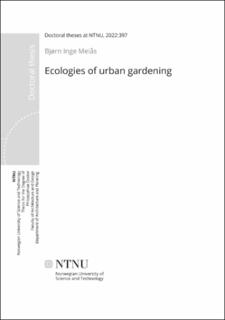| dc.contributor.advisor | Schwai, Markus | |
| dc.contributor.advisor | Edwards, Ferne Leigh | |
| dc.contributor.author | Melås, Bjørn Inge | |
| dc.date.accessioned | 2023-01-11T09:19:35Z | |
| dc.date.available | 2023-01-11T09:19:35Z | |
| dc.date.issued | 2022 | |
| dc.identifier.isbn | 978-82-326-5881-7 | |
| dc.identifier.issn | 2703-8084 | |
| dc.identifier.uri | https://hdl.handle.net/11250/3042595 | |
| dc.description.abstract | Norsk sammendrag
Et mer voldelig klima, masseutryddelsen av arter og ødeleggelsen av planeten er kun symptomer på en dypere økologisk krise. Den fysiske krisen vi opplever, i form av hetebølger, flom, tørke og branner, er bare toppen av isfjellet og henger sammen med en underliggende sosial og mental krise, en krise i hvordan vi tenker og handler, hvordan vi forholder oss til hverandre og resten av naturen. Ifølge psykoanalytikeren, filosofen og aktivisten Félix Guattari må krisen i de fysiske, sosiale og mentale økologiene behandles sammen (Guattari, 1989). Den økologiske krisen er drevet fram av kapitalismens umettelige krav om vekst. Dette innebygde jaget strider mot enhver form for bærekraft og kommer til å ødelegge stadig mer av livet på planeten om det får fortsette. Vekstøkonomien er avhengig av en billig natur, en natur som er utenfor oss, som kan utnyttes og herses med, for å vokse videre. Vi er nødt til å forstå at vi er en del av naturen – og at når vi ødelegger naturen, ødelegger vi også oss selv.
Det kunstneriske forskningsprosjektet Ecologies of urban gardening tar utgangspunkt i Félix Guattari sin øko-filosofi og undersøker hvordan urban dyrking kan bidra til en forandring i alle aspektene ved den økologiske krisen samtidig - mentalt, sosialt og fysisk. Urban dyrking forandrer ikke bare hvordan maten produseres, men kan også påvirke hvordan vi tenker og forholder oss til resten av naturen og forandre det fysiske miljøet, både lokalt og globalt. Dette kan være en del av en omstilling som hindrer de verste konsekvensene av den økologiske krisen ved å ta tak i røttene til problemet. Samtidig kan det bidra til å skape et fysisk miljø, en kultur og mennesker som er bedre rustet til å møte de økologiske utfordringene som kommer - og lage byrom og urban aktivitet som gir mening for oss som bor i byen i dag. Dette har blitt utforsket med en praktisk og kunstnerisk tilnærming, der opprettelse av og deltakelse i tre urbane jordbruksprosjekter har stått sentralt. Dette har vært arbeidsverktøy som har gitt erfaringer, opplevelser og utfordringer og har sendt arbeidet i forskjellige retninger, til tema som kompostering, jordhelse og framtidig utvikling av bynær matjord. Dette har blitt utforsket gjennom ulike former for skriving, aktivisme, foto, video, installasjoner og utstillinger. | en_US |
| dc.description.abstract | English summary
A more violent climate, the mass extinction of species and the degradation of the living world are merely symptoms of a much deeper crisis. The environmental crisis is only the tip of the iceberg and cannot be separated from an ecological crisis in our minds, social relations and institutions. Under the surface looms a crisis in the mental and social ecologies, the way we act and think, how we relate to each other and the environment. According to the psychoanalyst, activist and philosopher Félix Guattari, the health of the planet depends on the relations between the physical, social and mental ecologies, and to be able to deal with the interrelated crisis of environment, society and subjectivity, the three perspectives need to be approached together (Guattari, 1989). The ecological crisis is driven forward by capitalism's insatiable hunger for growth, and this endless demand is not compatible with any kind of sustainability. Capitalism depends on externalizing nature, so that it can be destroyed and exploited. We need to understand that we are part of this nature - and when we destroy nature, we are also destroying ourselves.
The artistic research project Ecologies of urban gardening departs from Félix Guattari’s ecological philosophy and explores urban gardening as a transversal practice, able to work across and repair the mental, social and physical aspects of the crisis at the same time. Urban gardening might change the way we think, the way we relate to each other and the rest of nature – and our physical environment, places and neighborhoods. Urban gardening might contribute to mitigating the worst consequences of the crisis by dealing with the ecological crisis at its roots. At the same time, it is an activity that can create physical environments, cultures and people better prepared for future ecological challenges - and create spaces and activities which makes sense, meaning and joy for urban citizens today. The project has been done through a practice-based and artistic approach, where initiating and being part of three urban gardens in Trondheim has been central. These gardens have been the working tools and have provided experiences and challenges, spurred new initiatives and explorations, and led the research into explorations on topics such as soil health, composting and the future of peri-urban land, which has been explored through writing, videos, photos, installations, and exhibitions. | en_US |
| dc.language.iso | eng | en_US |
| dc.publisher | NTNU | en_US |
| dc.relation.ispartofseries | Doctoral theses at NTNU;2022:397 | |
| dc.title | Ecologies of urban gardening | en_US |
| dc.type | Doctoral thesis | en_US |
| dc.subject.nsi | VDP::Humaniora: 000::Arkitektur og design: 140 | en_US |
| dc.description.localcode | Fulltext not available | en_US |
